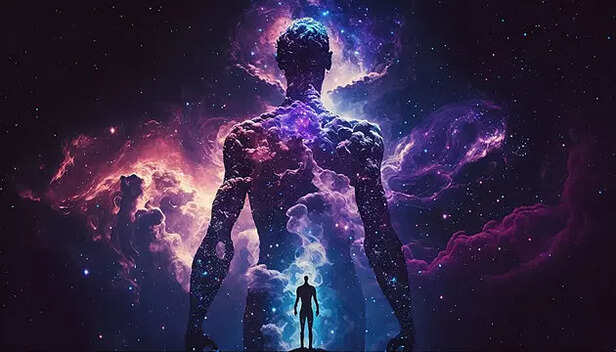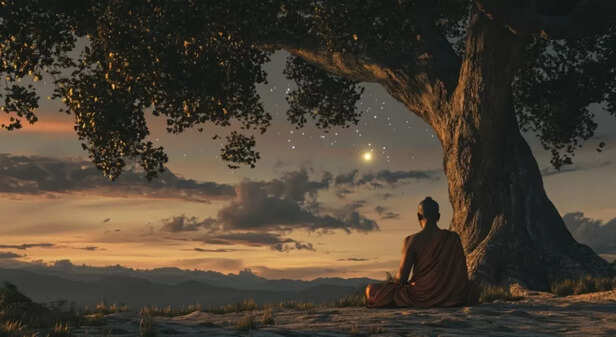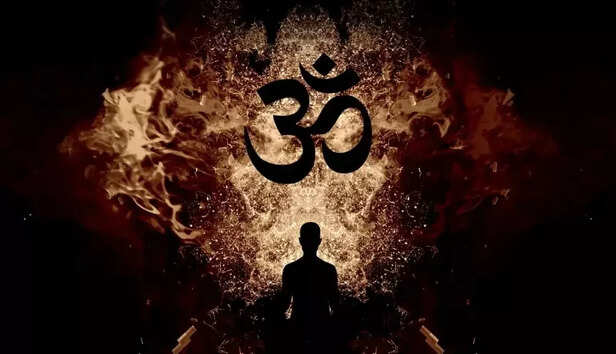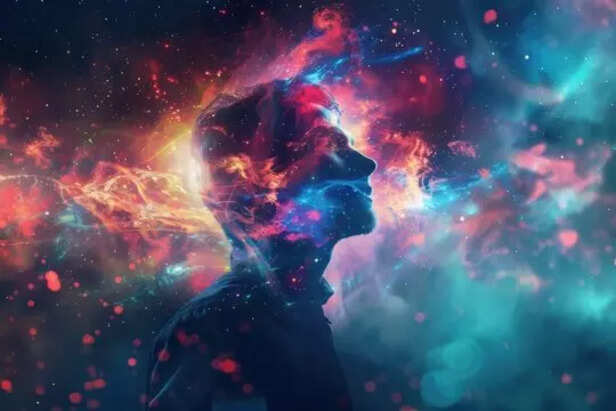Man Is God Asleep, God Is Man Awakened
Ankit Gupta | Jun 01, 2025, 20:26 IST
( Image credit : Pexels, Timeslife )
This suggests that in his ordinary state, man is unaware of his divine origin. The soul, or Atman, though divine, is covered by ignorance (Avidya), ego (Ahankara), desires (Kama), and illusion (Maya). When man transcends the ego, purifies the mind, and attains spiritual wisdom (Jnana), the divine reality within is revealed.
शिवोऽहम् – “I am Shiva.”
This ancient Mahavakya from the Upanishads does not seek to flatter human vanity. It points to a deep truth buried beneath layers of ignorance, habit, identity, and illusion. “Man is God asleep. God is man awakened.” This succinct statement is not poetry—it is prophecy. It captures the entire arc of human evolution, the journey of the individual soul from bondage to liberation, from slumber to awakening, from illusion to truth.

The soul, known as Atman in Vedantic philosophy, is not separate from Brahman, the ultimate reality. The Chandogya Upanishad proclaims: “Tat Tvam Asi” – “Thou art That.” Yet, we live in a world where this truth is not only forgotten but actively denied. Why?
Because the moment Brahman manifests as the individual soul (Jiva), it enters the domain of Maya, the power of illusion. Under Maya’s spell, the infinite forgets its infinitude and imagines itself as finite—a body, a mind, a story. This is God asleep.
Much like a dreamer who forgets he is sleeping and believes he is running from shadows or embracing illusions, the soul identifies with name and form (Nama-Rupa) and believes that to be its full identity. Hunger, fear, pleasure, and pain—all these become real. The divine sleeps in man, not because it has been destroyed, but because it is hidden. As the Katha Upanishad states:
“The Self is hidden in the heart of all beings, not seen by the eye, but seen by the heart purified through meditation and wisdom.”
Thus, man is not merely a fallen being or a creation separate from the Creator. He is God veiled in forgetfulness, trapped in the illusion of separateness.

To understand why man remains asleep to his divinity, one must examine the forces that sustain this slumber. The primary agent is Avidya, ignorance—not merely intellectual ignorance, but ontological ignorance, a not-knowing of the real self. This ignorance gives rise to the ego (Asmita), the false self which says, "I am the body," "I am this role," "I am this pain," "I am this success."
Once the ego takes root, it begins to accumulate experiences, likes and dislikes (Raga and Dvesha), fears (Abhinivesha), and attachments. These become Samskaras, impressions that push and pull the soul through countless rebirths. The divine is buried under these layers—much like a brilliant mirror gathering dust.
Even religion and spirituality, when misunderstood, reinforce the sleep. God is projected outwards, into the sky or in texts, not recognized within. Man prays, fasts, and follows rituals but does not look into the silence of his own heart.
The Bhagavad Gita acknowledges this state:
“Deluded by Maya, the world knows Me not, the Unborn and Imperishable.” (Gita 7.13)

Awakening is not an achievement. It is a remembering. The journey begins when the soul grows weary of dreams—when the promises of the world no longer satisfy, when success tastes hollow, and suffering becomes intolerable. This is often the moment of spiritual despair—but it is also a blessing.
The Upanishads narrate the story of Nachiketa, a boy who, through the fire of intense questioning and detachment, gains the knowledge of the Self. His journey is symbolic: the soul must ask, “Who am I?” with burning sincerity. This inquiry is the fire that begins to melt the chains of ignorance.
Meditation, contemplation, selfless action, devotion—all these are paths to awakening. But what truly awakens the soul is the direct experience of the Self. Not concepts, not beliefs, but Anubhava—realization.
“When the mind is silent, and the senses are at rest, the highest state is attained.” (Mandukya Upanishad)
And yet, even this realization is not “acquired.” It is grace—the final flash of recognition that comes not through effort but through surrender. Like a dreamer realizing he is dreaming, the soul awakens to find that it was never bound. It was always free, always divine.

When God awakens as man, man ceases to be merely a man. He becomes a Jivanmukta—liberated while still living. The Gita describes such a being:
“He who is the same to friend and foe, who is unaltered by honor or dishonor, who has transcended all dualities, he is dear to Me.” (Gita 12.18–19)
This awakened being is not special in a worldly sense. He may look ordinary, speak little, live simply. But the fragrance of freedom surrounds him. His joy is not pleasure. His love is not attachment. He walks in the world, but the world does not touch him.
What has he realized?
He has realized that there is no other. The subject and object are one. The knower and the known dissolve. All is Brahman. All is Self.
As the Ashtavakra Gita proclaims:
“I am pure awareness. The world is a play of consciousness. I am not the body. I am not the mind. I am that which witnesses all.”
Such a man does not die when the body dies. He has already died to illusion and is now merged with the infinite field of consciousness, which is neither born nor destroyed.
This great sleep and awakening have been depicted in many spiritual traditions:
“Man is God asleep. God is man awakened.” This is not a slogan. It is the most daring invitation ever offered. You are not what your documents say. You are not what your mind believes. You are not even your story.
You are consciousness itself, playing the game of forgetting and remembering. Your suffering is the dream’s shadow. Your joy is the soul’s memory of truth. When you finally stop looking outward and rest in the center of your being, the dream breaks.
And in that stillness, beyond thought, beyond belief, beyond name—you will know.
You were never man. You were always God.
The only difference was that now, you are awake.
This ancient Mahavakya from the Upanishads does not seek to flatter human vanity. It points to a deep truth buried beneath layers of ignorance, habit, identity, and illusion. “Man is God asleep. God is man awakened.” This succinct statement is not poetry—it is prophecy. It captures the entire arc of human evolution, the journey of the individual soul from bondage to liberation, from slumber to awakening, from illusion to truth.
The Forgetfulness

When God Becomes Man
( Image credit : Pexels )
The soul, known as Atman in Vedantic philosophy, is not separate from Brahman, the ultimate reality. The Chandogya Upanishad proclaims: “Tat Tvam Asi” – “Thou art That.” Yet, we live in a world where this truth is not only forgotten but actively denied. Why?
Because the moment Brahman manifests as the individual soul (Jiva), it enters the domain of Maya, the power of illusion. Under Maya’s spell, the infinite forgets its infinitude and imagines itself as finite—a body, a mind, a story. This is God asleep.
Much like a dreamer who forgets he is sleeping and believes he is running from shadows or embracing illusions, the soul identifies with name and form (Nama-Rupa) and believes that to be its full identity. Hunger, fear, pleasure, and pain—all these become real. The divine sleeps in man, not because it has been destroyed, but because it is hidden. As the Katha Upanishad states:
“The Self is hidden in the heart of all beings, not seen by the eye, but seen by the heart purified through meditation and wisdom.”
Thus, man is not merely a fallen being or a creation separate from the Creator. He is God veiled in forgetfulness, trapped in the illusion of separateness.
The Architecture of Sleep

Ego, Maya, and Samskara
( Image credit : Pixabay )
To understand why man remains asleep to his divinity, one must examine the forces that sustain this slumber. The primary agent is Avidya, ignorance—not merely intellectual ignorance, but ontological ignorance, a not-knowing of the real self. This ignorance gives rise to the ego (Asmita), the false self which says, "I am the body," "I am this role," "I am this pain," "I am this success."
Once the ego takes root, it begins to accumulate experiences, likes and dislikes (Raga and Dvesha), fears (Abhinivesha), and attachments. These become Samskaras, impressions that push and pull the soul through countless rebirths. The divine is buried under these layers—much like a brilliant mirror gathering dust.
Even religion and spirituality, when misunderstood, reinforce the sleep. God is projected outwards, into the sky or in texts, not recognized within. Man prays, fasts, and follows rituals but does not look into the silence of his own heart.
The Bhagavad Gita acknowledges this state:
“Deluded by Maya, the world knows Me not, the Unborn and Imperishable.” (Gita 7.13)
The Process of Awakening

Despair, Inquiry, and Grace
Awakening is not an achievement. It is a remembering. The journey begins when the soul grows weary of dreams—when the promises of the world no longer satisfy, when success tastes hollow, and suffering becomes intolerable. This is often the moment of spiritual despair—but it is also a blessing.
The Upanishads narrate the story of Nachiketa, a boy who, through the fire of intense questioning and detachment, gains the knowledge of the Self. His journey is symbolic: the soul must ask, “Who am I?” with burning sincerity. This inquiry is the fire that begins to melt the chains of ignorance.
Meditation, contemplation, selfless action, devotion—all these are paths to awakening. But what truly awakens the soul is the direct experience of the Self. Not concepts, not beliefs, but Anubhava—realization.
“When the mind is silent, and the senses are at rest, the highest state is attained.” (Mandukya Upanishad)
And yet, even this realization is not “acquired.” It is grace—the final flash of recognition that comes not through effort but through surrender. Like a dreamer realizing he is dreaming, the soul awakens to find that it was never bound. It was always free, always divine.
The Realized Man

When God Wakes Up
When God awakens as man, man ceases to be merely a man. He becomes a Jivanmukta—liberated while still living. The Gita describes such a being:
“He who is the same to friend and foe, who is unaltered by honor or dishonor, who has transcended all dualities, he is dear to Me.” (Gita 12.18–19)
This awakened being is not special in a worldly sense. He may look ordinary, speak little, live simply. But the fragrance of freedom surrounds him. His joy is not pleasure. His love is not attachment. He walks in the world, but the world does not touch him.
What has he realized?
He has realized that there is no other. The subject and object are one. The knower and the known dissolve. All is Brahman. All is Self.
As the Ashtavakra Gita proclaims:
“I am pure awareness. The world is a play of consciousness. I am not the body. I am not the mind. I am that which witnesses all.”
Such a man does not die when the body dies. He has already died to illusion and is now merged with the infinite field of consciousness, which is neither born nor destroyed.
Symbolism in Mythology and Mysticism
- Hiranyagarbha, the golden womb in Vedanta, is the dreaming God from whom the universe arises—creation itself is a kind of divine dream.
- In Kashmir Shaivism, Paramashiva becomes Jiva through limitation but retains the power to awaken.
- Christ’s crucifixion and resurrection symbolically represent the death of the ego and the birth of the divine man.
- In Sufi mysticism, Rumi writes: “Why do you stay in prison, when the door is so wide open?”
Waking Up to the Truth
You are consciousness itself, playing the game of forgetting and remembering. Your suffering is the dream’s shadow. Your joy is the soul’s memory of truth. When you finally stop looking outward and rest in the center of your being, the dream breaks.
And in that stillness, beyond thought, beyond belief, beyond name—you will know.
You were never man. You were always God.
The only difference was that now, you are awake.
